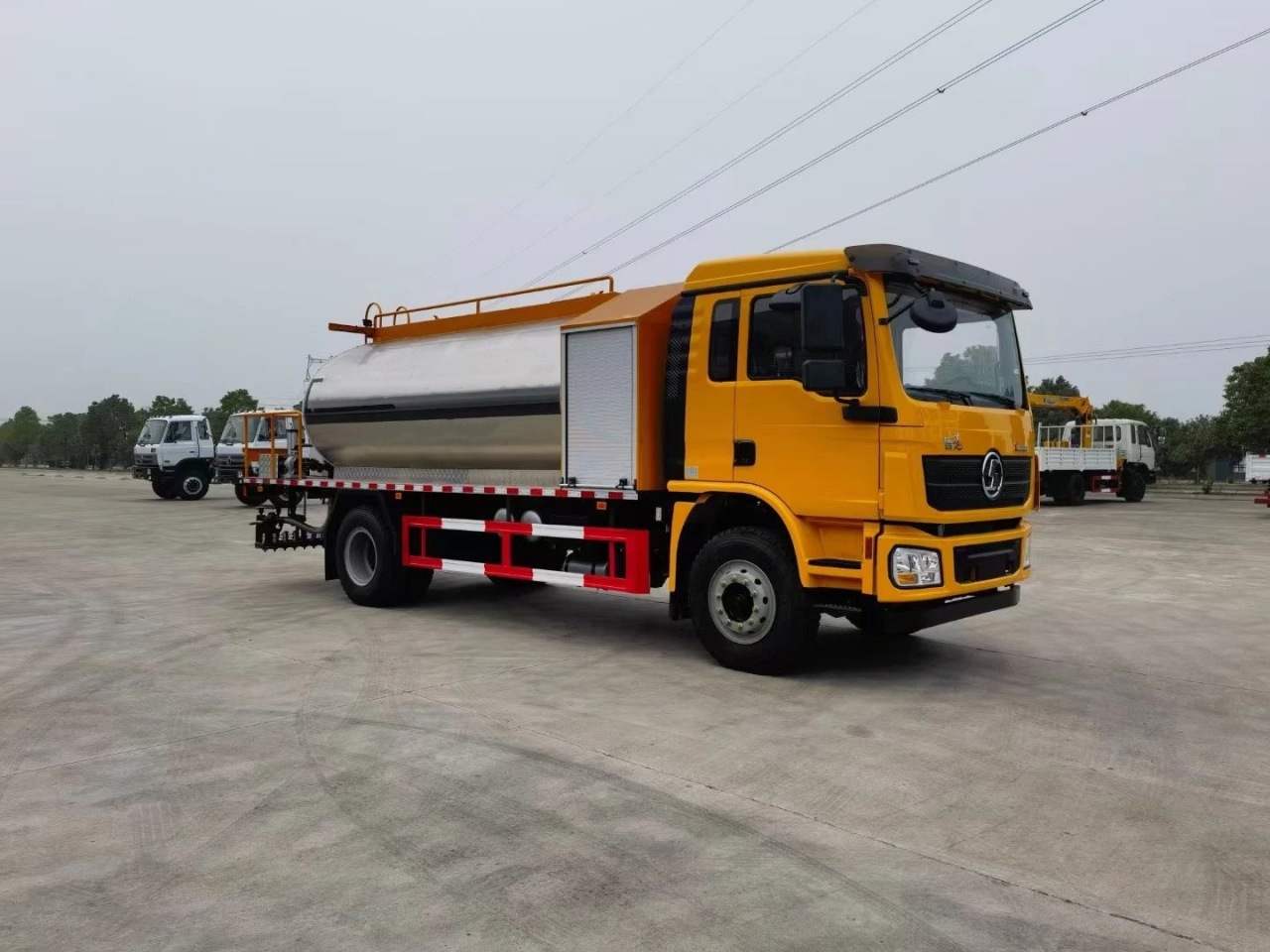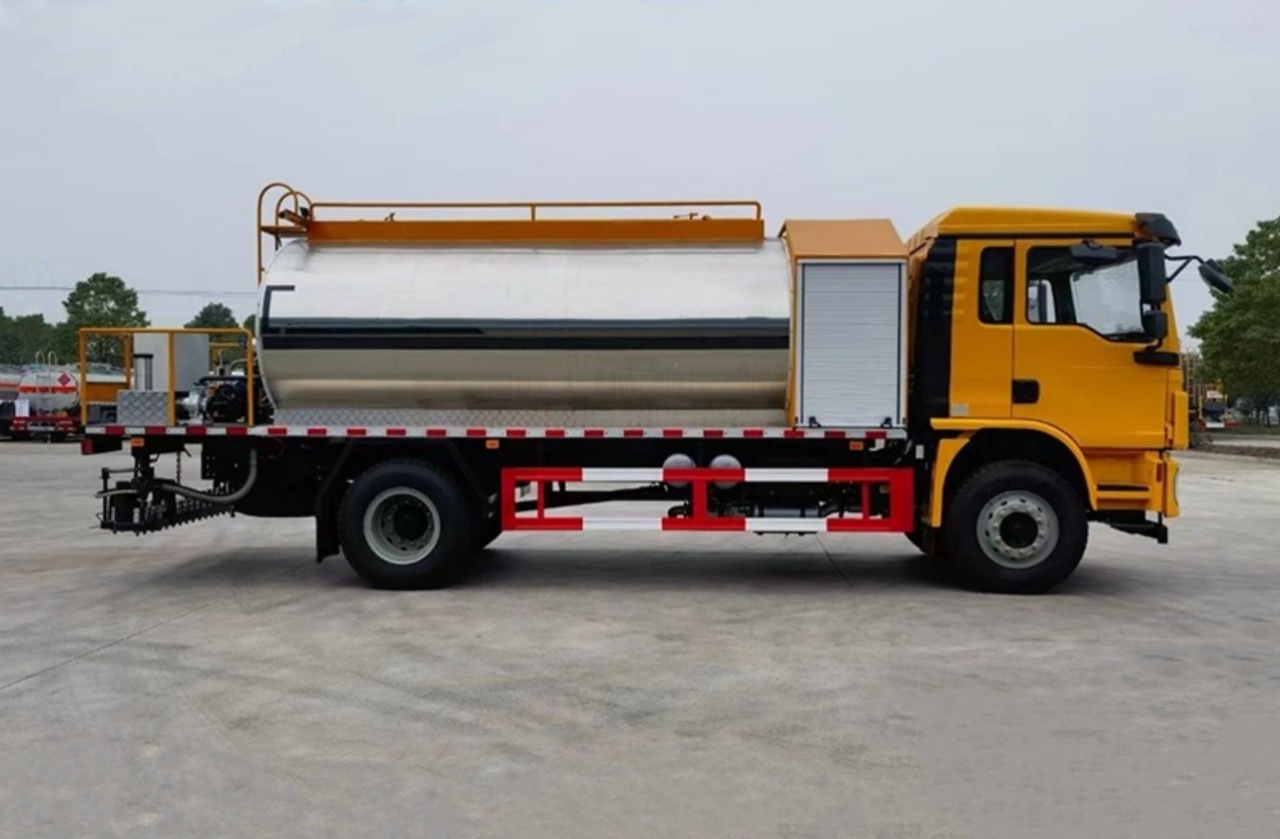Asphalt Tank Truck: Functions, Insulation & Safety Features for Asphalt Delivery
Asphalt tank trucks are crucial for the transportation and delivery of asphalt, a key material in road construction and maintenance. These specialized vehicles are designed to carry liquid asphalt, which is used in the production of bitumen-based road surfacing. Due to the unique properties of asphalt—primarily its high temperature when in liquid form and its viscous nature—tank trucks must be equipped with advanced technology to ensure safe, efficient, and reliable transport. This article delves into the core functions of asphalt tank trucks, the role of insulation in maintaining asphalt temperature, and the vital safety features that ensure the safe delivery of this critical construction material.
Functions of Asphalt Tank Trucks
The primary function of an asphalt tank truck is to transport liquid asphalt from production facilities, such as refineries or asphalt plants, to construction sites where it will be used for paving and road repairs. Asphalt is typically transported in a liquid state at elevated temperatures (ranging from 300°F to 400°F or higher) to ensure it remains fluid enough to be pumped into paving machines. The tank trucks are equipped with specialized tanks and systems to handle this task safely.
- Asphalt Delivery: Asphalt tank trucks are essential in the construction and maintenance of roadways, parking lots, and airstrips. These trucks transport liquid asphalt directly to job sites, where it is unloaded into storage tanks or directly applied using paving equipment.
- Temperature Maintenance: Asphalt needs to be delivered at the right temperature to remain workable. Tank trucks are equipped with heating systems that keep the asphalt at the optimal temperature for easy application and handling. The tank’s ability to maintain the asphalt’s high temperature is critical for the successful execution of construction projects.
- Volume Control and Discharge: Asphalt tank trucks are designed to carry large volumes of liquid asphalt. These trucks often feature pump systems that facilitate the controlled unloading of asphalt onto job sites or into other storage units. Accurate metering ensures the right amount of asphalt is dispensed, reducing waste and ensuring the quality of the work.
- Long-Distance Transport: Asphalt tank trucks are built to travel long distances between production plants and construction sites. As asphalt is highly sensitive to temperature fluctuations, these trucks are designed to handle the material’s unique demands over extended periods.

Insulation in Asphalt Tank Trucks
Asphalt is typically transported in a liquid state at elevated temperatures, and maintaining this temperature throughout transport is critical to preserving the quality and workability of the asphalt. Insulation is, therefore, an essential feature of asphalt tank trucks.
- Thermal Insulation Materials: To prevent heat loss during transport, asphalt tank trucks are insulated with advanced materials such as fiberglass, polyurethane foam, or mineral wool. These materials act as a barrier to heat loss, ensuring that the asphalt inside the tank stays at the desired temperature for as long as possible. The insulation also helps prevent the asphalt from cooling and solidifying, which would render it unusable.
- Double-Walled Tanks: Many asphalt tank trucks feature double-walled tanks. The outer layer provides additional protection, while the inner layer is insulated to prevent heat loss. The space between the 2 walls can sometimes be vacuum-sealed or filled with insulation material, offering enhanced thermal protection. This construction is especially important for long-distance transport or during colder weather.
- Temperature Monitoring and Control: To ensure the asphalt remains at the correct temperature, many tank trucks are equipped with temperature monitoring systems. These systems include sensors embedded within the tank, which provide real-time data on the asphalt’s temperature. In some models, temperature controllers automatically adjust the heating systems to maintain the desired temperature, adding another layer of precision to the asphalt transport process.
- Heating Systems: Heating is a critical component in the design of asphalt tank trucks. Commonly, tank trucks are equipped with either direct or indirect heating systems. Direct heating involves using burners that directly heat the asphalt inside the tank, while indirect heating uses steam coils or heated fluids that circulate the tank. Both systems are designed to maintain the asphalt’s fluidity and prevent it from cooling too much during transit.
Safety Features in Asphalt Tank Trucks
Asphalt is a hazardous material that can pose several risks, including burns, fires, and exposure to harmful fumes. Therefore, asphalt tank trucks are equipped with a range of safety features to mitigate these risks. Below are some of the key safety features found in asphalt tank trucks:
- Thermal Insulation for Fire Protection: In addition to helping maintain the temperature of the asphalt, insulation also serves a fire-safety function. Asphalt is flammable when exposed to high heat, and the insulation helps to shield the material from external heat sources. In case of a fire or accident, the insulation can slow down the spread of heat to the tank, giving the driver and emergency responders more time to act.
- Pressure Relief Valves: Asphalt tank trucks often operate under high pressure, particularly when pumping the asphalt during delivery. To prevent excessive buildup of pressure, these trucks are equipped with pressure relief valves. These valves automatically release pressure when it exceed safe levels, reducing the risk of tank rupture or explosions.
- Overfill Protection: Overfilling a tank truck can cause asphalt spillage, which is not only wasteful but also hazardous. To prevent overfilling, modern asphalt tank trucks are equipped with overfill protection systems. These systems include alarms or automatic shut-off mechanisms that stop the flow of asphalt when the tank reaches its capacity.
- Temperature Alarms: Given the high temperatures at which asphalt is transported, temperature alarms are critical for alerting drivers and operators if the asphalt’s temperature exceeds safe levels. This feature helps prevent overheating, which could lead to fires or tank damage.
- Safety Valves and Hose Couplings: Safe unloading of asphalt is paramount to prevent spills, burns, or leaks. Asphalt tank trucks are equipped with safety valves and hose couplings that ensure the safe and efficient transfer of material from the truck to the job site. These fittings are designed to prevent accidental discharges and ensure the tank remains secure during transport and unloading.
- Fire Extinguishers and Emergency Equipment: Given the flammability of asphalt, tank trucks are often equipped with fire extinguishers and emergency response kits. These supplies help address potential fires and hazardous situations that might arise during transport or unloading.
- Driver Protection: The driver’s cabin of an asphalt tank truck is typically fitted with protective features such as fire-resistant materials, emergency exits, and communication systems. These measures ensure that the driver is protected in case of a spill or accident.

Conclusion
Asphalt tank trucks play a crucial role in the delivery and transportation of asphalt, a fundamental material for road construction and maintenance. Their specialized functions, advanced insulation systems, and extensive safety features are designed to ensure that asphalt remains at the optimal temperature during transport while minimizing risks to drivers, workers, and the environment. Insulation materials, temperature control systems, and safety mechanisms like pressure relief valves, overfill protection, and fire-resistant designs are just a few of the key aspects that make asphalt tank trucks both reliable and safe.
As the demand for road infrastructure continues to grow, the design and technology behind asphalt tank trucks will continue to evolve, with a focus on improving safety, efficiency, and sustainability. By meeting the challenges of transporting one of the world’s most essential construction materials, asphalt tank trucks contribute to the development and maintenance of the roads we rely on every day.

